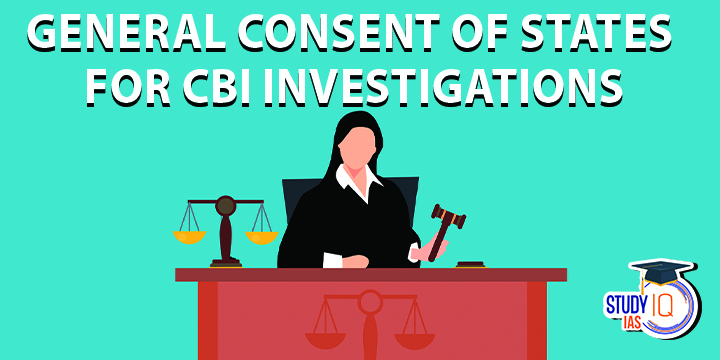Table of Contents
About Consent of States for CBI Investigations
- Legal and Constitutional Basis: According to Section 6 of the Delhi Special Police Establishment Act of 1946 under which the CBI functions, the State’s consent is required to extend CBI investigation beyond Union Territories.
- Types of Consent: There are two types of consent for a probe by the CBI.
- General Consent: When a state gives a general consent to the CBI for probing a case, the agency is not required to seek fresh permission every time it enters that state in connection with investigation or for every case.
- A general consent is given to facilitate that seamless investigation in a case of corruption or violence.
- Specific Consent: When a general consent is withdrawn, CBI needs to seek case-wise consent for investigation from the concerned state government.
- If specific consent is not granted, the CBI officials will not have the power of police personnel when they enter that state.
- This hurdle impedes seamless investigation by the CBI.
- Specific Consent: When a general consent is withdrawn, CBI needs to seek case-wise consent for investigation from the concerned state government.
- The CBI’s position is in this respect different from that of the National Investigation Agency (NIA), which is governed by The NIA Act, 2008, and has jurisdiction across the country.
Consent of States for CBI Investigations History
- Traditionally, almost all states have given CBI general consent. However, since 2015, several states have revoked their
- On March 4 this year, Meghalaya became the ninth state to have withdrawn consent to the CBI after Maharashtra, Punjab, Rajasthan, West Bengal, Jharkhand, Chhattisgarh, Kerala, and Mizoram.
- Out of these states, Maharashtra has now reversed its decision and restored general consent.
Implications of Withdrawal of Consent of States for CBI Investigations
- Legal and Constitutional Basis: According to Section 6 of the Delhi Special Police Establishment Act of 1946 under which the CBI functions, the State’s consent is required to extend CBI investigation beyond Union Territories.
- Types of Consent: There are two types of consent for a probe by the CBI.
- General Consent: When a state gives a general consent to the CBI for probing a case, the agency is not required to seek fresh permission every time it enters that state in connection with investigation or for every case.
- A general consent is given to facilitate that seamless investigation in a case of corruption or violence.
- Specific Consent: When a general consent is withdrawn, CBI needs to seek case-wise consent for investigation from the concerned state government.
- If specific consent is not granted, the CBI officials will not have the power of police personnel when they enter that state.
- This hurdle impedes seamless investigation by the CBI.
- Specific Consent: When a general consent is withdrawn, CBI needs to seek case-wise consent for investigation from the concerned state government.
- The CBI’s position is in this respect different from that of the National Investigation Agency (NIA), which is governed by The NIA Act, 2008, and has jurisdiction across the country.
- No registration of fresh cases: It means the CBI will not be able to register any fresh case involving officials of the central government or a private person in the state without the consent of the state government.
- Loss of power: CBI officers will lose all powers of a police officer as soon as they enter the state unless the state government has allowed them.
Consent of States for CBI Investigations Judicial Review
- Legal and Constitutional Basis: According to Section 6 of the Delhi Special Police Establishment Act of 1946 under which the CBI functions, the State’s consent is required to extend CBI investigation beyond Union Territories.
- Types of Consent: There are two types of consent for a probe by the CBI.
- General Consent: When a state gives a general consent to the CBI for probing a case, the agency is not required to seek fresh permission every time it enters that state in connection with investigation or for every case.
- A general consent is given to facilitate that seamless investigation in a case of corruption or violence.
- Specific Consent: When a general consent is withdrawn, CBI needs to seek case-wise consent for investigation from the concerned state government.
- If specific consent is not granted, the CBI officials will not have the power of police personnel when they enter that state.
- This hurdle impedes seamless investigation by the CBI.
- Specific Consent: When a general consent is withdrawn, CBI needs to seek case-wise consent for investigation from the concerned state government.
- The CBI’s position is in this respect different from that of the National Investigation Agency (NIA), which is governed by The NIA Act, 2008, and has jurisdiction across the country.
- Advance Insurance Co. Ltd. Vs Shri Gurudasmal, 1970: A Constitution Bench of Supreme Court held that the definition of “State”, as contained in The General Clauses Act, includes Union Territories as well.
- Hence the CBI, being a force constituted for Union Territories as recognized under the Delhi Special Police Establishment Act of 1946, can conduct investigation into the territories of the States only with their consent.
- Kazi Lendhup Dorji Vs CBI, 1994: The Supreme Court held that the withdrawal of general consent does not affect pending investigation.
- The withdrawal also does not affect the cases registered in another State in relation to which investigation leads into the territory of the State which has withdrawn general consent.
- Withdrawal does not circumscribe the power of the jurisdictional High Court to order a CBI investigation.
Central Bureau of Investigation (CBI)
- Establishment: The CBI was set up in 1963 by a resolution of the Ministry of Home Affairs based on the recommendations of the Santhanam Committee on Prevention of Corruption (1962–1964).
- Type: The CBI is not a statutory body. It derives its powers from the Delhi Special Police Establishment Act, 1946.
- Parent organization: The CBI comes under the administrative control of the Department of Personnel and Training (DoPT) of the Ministry of Personnel, Public Grievances and Pensions.
- Functions:
- The CBI is the main investigating agency of the Central Government.
- It also provides assistance to the Central Vigilance Commission and Lokpal.
- It is also the nodal police agency in India which coordinates investigations on behalf of INTERPOL Member countries.
- Appointment of the Director: Director is responsible for the administration of the organization.
- Till 2014, the CBI Director was appointed on the basis of the DSPE Act, 1946.
- In 2014, the Lokpal Act provided a committee for appointment of CBI Director:
- Headed by Prime Minister
- Other members – Leader of Opposition/ Leader of the single largest opposition party, Chief Justice of India/ a Supreme Court Judge.
- Home Ministry sends a list of eligible candidates to DoPT. Then, the DoPT prepares the final list on basis of seniority, integrity, and experience in the investigation of anti-corruption cases, and sends it to the committee.
- Tenure of the director:
- Director of CBI has been provided security of two year tenure, by the CVC Act, 2003.
- The Delhi Special Police Establishment (Amendment) Act, 2021 has extended the tenures of the directors of the CBI and the Enforcement Directorate from two years to up to five years.
- Types of cases that CBI can take up:
- Anti-corruption crimes, Economic offences and Special Crimes.
- CBI can suo-moto take up investigation of offences only in the Union Territories.


 Daily Quiz 18 April 2025
Daily Quiz 18 April 2025
 OSSC CGL Syllabus 2025 and Exam Pattern ...
OSSC CGL Syllabus 2025 and Exam Pattern ...
 AI and its Regulation in India, Limitati...
AI and its Regulation in India, Limitati...





















